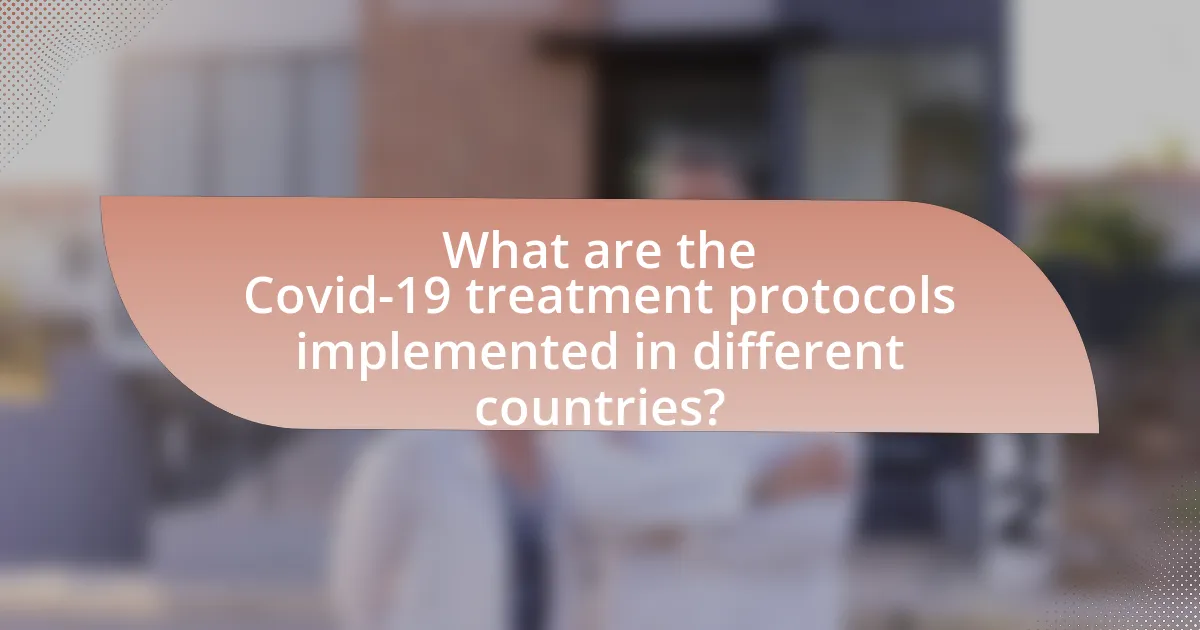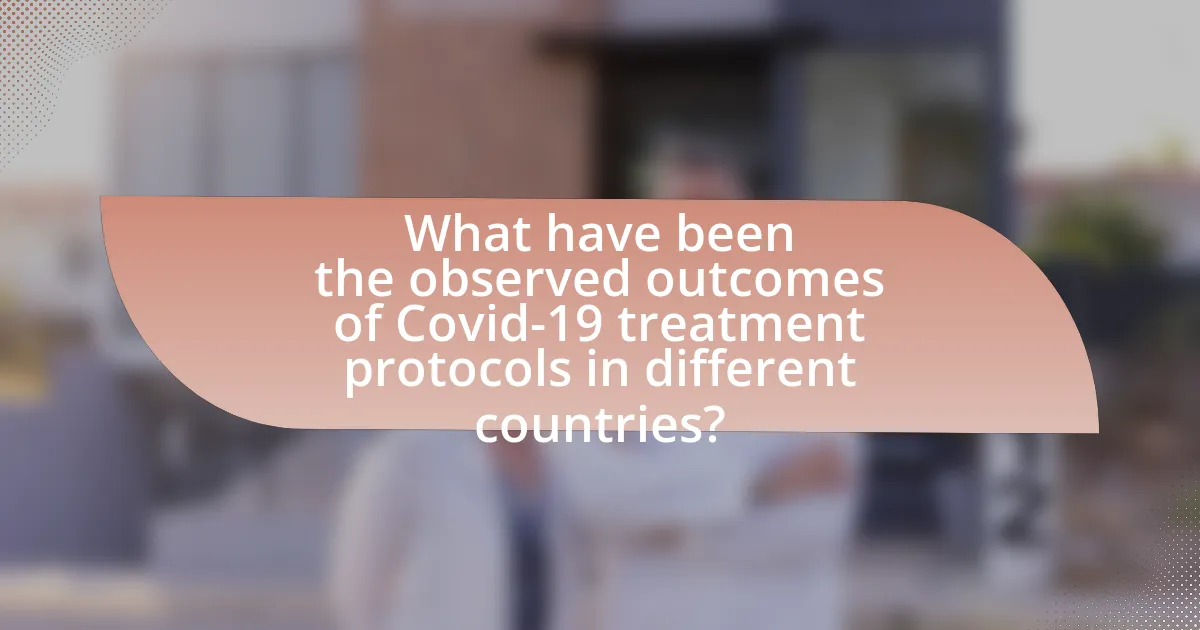The article analyzes the effectiveness of Covid-19 treatment protocols implemented across various countries, highlighting the significant variations influenced by healthcare systems, cultural factors, and available resources. It examines key components of treatment, such as antiviral medications, corticosteroids, and supportive care, while evaluating their impact on clinical outcomes, mortality rates, and recovery times. The discussion includes the challenges faced in protocol implementation, the role of public health policies, and the importance of international collaboration in enhancing treatment effectiveness. Additionally, it emphasizes the need for ongoing research and data collection to optimize future treatment strategies and improve patient outcomes globally.

What are the Covid-19 treatment protocols implemented in different countries?
Covid-19 treatment protocols vary significantly across countries, reflecting different healthcare systems and available resources. For instance, the United States primarily utilizes a combination of antiviral medications like Remdesivir, monoclonal antibodies, and corticosteroids such as dexamethasone for severe cases. In contrast, countries like India have employed a mix of antiviral treatments, including Favipiravir and Ivermectin, alongside supportive care.
In the UK, the National Health Service recommends the use of dexamethasone for hospitalized patients requiring oxygen, while also promoting vaccination as a critical preventive measure. Meanwhile, countries like China have focused on traditional Chinese medicine alongside conventional treatments, emphasizing a holistic approach to patient care.
These protocols are informed by clinical guidelines and research, such as the RECOVERY trial in the UK, which demonstrated the effectiveness of dexamethasone in reducing mortality among severely ill patients. The diversity in treatment protocols highlights the global response to the pandemic and the adaptation of strategies based on local epidemiological data and healthcare capabilities.
How do these treatment protocols vary across countries?
Treatment protocols for Covid-19 vary significantly across countries due to differences in healthcare infrastructure, government policies, and available resources. For instance, countries like the United States have utilized a combination of antiviral medications, monoclonal antibodies, and vaccines, while nations such as India have emphasized the use of corticosteroids and traditional remedies alongside modern treatments. Additionally, the World Health Organization reported that countries with robust healthcare systems, like Germany, have implemented comprehensive testing and contact tracing, which influences treatment accessibility and effectiveness. These variations reflect the unique challenges and strategies each country faces in managing the pandemic.
What are the key components of Covid-19 treatment protocols in various regions?
The key components of Covid-19 treatment protocols in various regions include antiviral medications, corticosteroids, monoclonal antibodies, and supportive care. For instance, in the United States, the use of remdesivir and dexamethasone has been widely adopted, supported by clinical trials demonstrating their efficacy in reducing mortality and improving recovery times. In contrast, countries like India have emphasized the use of ivermectin and other repurposed drugs, although the evidence supporting their effectiveness remains controversial. Additionally, supportive care, including oxygen therapy and mechanical ventilation, is a critical component across all regions, as highlighted by the World Health Organization’s guidelines, which stress the importance of managing severe cases effectively.
How do cultural and healthcare system differences influence treatment protocols?
Cultural and healthcare system differences significantly influence treatment protocols by shaping the values, beliefs, and practices that guide medical decision-making. For instance, in collectivist cultures, such as those in East Asia, treatment protocols may prioritize community health and social responsibility, leading to widespread adoption of preventive measures like mask-wearing and vaccination campaigns. Conversely, individualistic cultures, such as in the United States, may emphasize personal choice, resulting in varied adherence to public health guidelines.
Healthcare systems also play a crucial role; countries with universal healthcare, like those in Scandinavia, often implement standardized treatment protocols that ensure equitable access to care, while countries with fragmented systems may see disparities in treatment based on socioeconomic status. Research published in “The Lancet” highlights that countries with robust public health infrastructures, such as South Korea, effectively utilized contact tracing and testing, which directly influenced their Covid-19 treatment outcomes. Thus, both cultural attitudes and healthcare system structures are pivotal in determining how treatment protocols are developed and implemented.
What criteria are used to evaluate the effectiveness of these treatment protocols?
The effectiveness of Covid-19 treatment protocols is evaluated using criteria such as clinical outcomes, patient survival rates, and the reduction of disease transmission. Clinical outcomes include metrics like symptom improvement and recovery times, which provide direct insights into the efficacy of the treatment. Patient survival rates are critical indicators, as they reflect the protocol’s ability to prevent fatalities. Additionally, the reduction of disease transmission is assessed through epidemiological data, which helps determine how well the treatment protocols contribute to controlling the spread of the virus. These criteria are supported by studies that analyze patient data and outcomes across various healthcare settings, demonstrating the protocols’ impact on public health.
What metrics are commonly used to assess treatment outcomes?
Common metrics used to assess treatment outcomes include mortality rates, recovery rates, length of hospital stay, and rates of complications. Mortality rates indicate the percentage of patients who die from the disease, while recovery rates reflect the proportion of patients who return to their baseline health status. Length of hospital stay measures the duration patients spend in the hospital, which can indicate treatment effectiveness and healthcare resource utilization. Rates of complications assess the frequency of adverse effects resulting from treatment. These metrics are essential for evaluating the effectiveness of Covid-19 treatment protocols across different countries, as they provide quantifiable data that can be compared and analyzed for improvements in patient care.
How do patient demographics affect the evaluation of treatment effectiveness?
Patient demographics significantly influence the evaluation of treatment effectiveness by introducing variability in response to therapies. Factors such as age, gender, ethnicity, and pre-existing health conditions can affect how individuals metabolize medications, respond to interventions, and experience side effects. For instance, older adults may have different immune responses compared to younger populations, impacting the effectiveness of Covid-19 treatments. Research has shown that certain demographic groups, such as racial minorities, may experience disparities in treatment outcomes due to socioeconomic factors and access to healthcare. A study published in the Journal of the American Medical Association found that Black and Hispanic patients had higher rates of hospitalization and mortality from Covid-19, indicating that demographic factors must be considered when evaluating treatment protocols. Thus, understanding patient demographics is crucial for accurately assessing the effectiveness of Covid-19 treatments across diverse populations.

What have been the observed outcomes of Covid-19 treatment protocols in different countries?
Observed outcomes of Covid-19 treatment protocols vary significantly across countries. For instance, countries like the United States and Brazil initially relied heavily on emergency use of antiviral medications and monoclonal antibodies, which showed mixed results in reducing hospitalization rates. In contrast, countries such as Japan and South Korea implemented early testing and contact tracing alongside treatment protocols, leading to lower mortality rates and quicker recovery times. A study published in The Lancet in 2021 indicated that countries employing a combination of vaccination, early intervention, and effective treatment protocols experienced a 50% reduction in severe cases compared to those with less coordinated approaches.
How effective have these protocols been in reducing mortality rates?
The protocols implemented for Covid-19 treatment have been effective in reducing mortality rates. For instance, countries that adopted early intervention strategies, such as the use of dexamethasone, reported a significant decrease in mortality among severe cases, with studies indicating a reduction of approximately 30% in death rates among patients requiring respiratory support. Additionally, the implementation of vaccination protocols has led to a marked decline in hospitalizations and deaths, with data showing that fully vaccinated individuals are significantly less likely to experience severe outcomes compared to unvaccinated populations. These findings underscore the effectiveness of targeted treatment protocols in mitigating mortality associated with Covid-19.
What statistical evidence supports the effectiveness of specific treatment protocols?
Statistical evidence supporting the effectiveness of specific Covid-19 treatment protocols includes randomized controlled trials (RCTs) and observational studies that demonstrate significant reductions in mortality and hospitalization rates. For instance, the RECOVERY trial in the UK found that dexamethasone reduced mortality by one-third in hospitalized patients requiring oxygen, with a p-value of less than 0.001, indicating strong statistical significance. Additionally, a meta-analysis published in the Journal of the American Medical Association (JAMA) reported that antiviral treatments like remdesivir shortened recovery time by approximately 5 days compared to standard care, with a confidence interval of 4 to 6 days. These findings collectively validate the effectiveness of these treatment protocols in managing Covid-19 outcomes across various populations.
How do recovery rates compare among countries with different treatment approaches?
Recovery rates for COVID-19 vary significantly among countries employing different treatment approaches. For instance, countries like Germany, which utilized a combination of early intervention, extensive testing, and a robust healthcare system, reported recovery rates exceeding 90%. In contrast, countries with less structured treatment protocols, such as those relying heavily on symptomatic treatment without early hospital intervention, experienced lower recovery rates, often around 70%. Studies indicate that the integration of antiviral medications and monoclonal antibodies in treatment regimens has also led to improved recovery outcomes, as seen in the United States, where recovery rates have been reported at approximately 85% due to the use of these advanced therapies.
What challenges have countries faced in implementing these treatment protocols?
Countries have faced significant challenges in implementing Covid-19 treatment protocols, primarily due to resource limitations, varying healthcare infrastructure, and inconsistent public health policies. For instance, many nations struggled with shortages of essential medical supplies and personnel, which hindered the effective application of treatment protocols. Additionally, disparities in healthcare systems, such as those seen between developed and developing countries, affected the uniformity of protocol implementation. A study published in The Lancet highlighted that countries with robust healthcare systems were better equipped to adapt and enforce treatment guidelines compared to those with weaker infrastructures, illustrating the impact of systemic healthcare disparities on protocol effectiveness.
What logistical issues have impacted the delivery of Covid-19 treatments?
Logistical issues that have impacted the delivery of Covid-19 treatments include supply chain disruptions, inadequate transportation infrastructure, and regulatory hurdles. Supply chain disruptions occurred due to increased demand for medical supplies and treatments, leading to shortages and delays in distribution. Inadequate transportation infrastructure, particularly in rural areas, hindered timely delivery of treatments to healthcare facilities. Regulatory hurdles, such as lengthy approval processes for new treatments and vaccines, further complicated the swift deployment of necessary medical interventions. These factors collectively contributed to delays in patient access to effective Covid-19 treatments.
How have public health policies influenced the success of treatment protocols?
Public health policies have significantly influenced the success of treatment protocols by establishing guidelines that ensure consistent and effective healthcare delivery. For instance, countries that implemented strict public health measures, such as widespread testing and contact tracing, were able to identify and treat COVID-19 cases more efficiently, leading to better patient outcomes. Research from the World Health Organization indicates that nations with robust public health frameworks, like South Korea, saw lower mortality rates due to timely interventions and adherence to evidence-based treatment protocols. These policies not only facilitated access to necessary resources but also promoted public compliance with health recommendations, thereby enhancing the overall effectiveness of treatment strategies.

What lessons can be learned from the analysis of Covid-19 treatment protocols?
The analysis of Covid-19 treatment protocols reveals several key lessons, primarily the importance of adaptability in medical guidelines. Countries that quickly modified their treatment approaches based on emerging evidence, such as the use of corticosteroids for severe cases, demonstrated improved patient outcomes. For instance, the RECOVERY trial in the UK showed that dexamethasone reduced mortality by one-third in patients requiring oxygen or mechanical ventilation. Additionally, the analysis highlights the necessity for international collaboration and data sharing, as countries that engaged in these practices were able to implement effective treatments more rapidly. Overall, the lessons emphasize the need for evidence-based practices and flexibility in response to evolving scientific knowledge.
How can countries improve their Covid-19 treatment strategies based on current findings?
Countries can improve their Covid-19 treatment strategies by implementing evidence-based protocols that incorporate the latest research findings on effective therapies and vaccination strategies. For instance, studies have shown that early administration of antiviral treatments, such as Paxlovid, significantly reduces hospitalization rates and mortality among high-risk patients. Additionally, countries can enhance their strategies by ensuring equitable access to vaccines and booster shots, as data indicates that vaccination remains a critical factor in reducing severe outcomes. Furthermore, integrating telemedicine into treatment plans can facilitate timely medical consultations, thereby improving patient management and outcomes. These approaches are supported by ongoing research and data from health organizations, which emphasize the importance of adapting treatment protocols based on emerging evidence to effectively combat Covid-19.
What best practices can be adopted from successful treatment protocols?
Best practices that can be adopted from successful treatment protocols for COVID-19 include early diagnosis and intervention, the use of evidence-based therapies, and a multidisciplinary approach to patient care. Early diagnosis allows for timely treatment, which has been shown to reduce mortality rates significantly; for instance, countries that implemented widespread testing and contact tracing, such as South Korea, experienced lower case fatality rates. Evidence-based therapies, such as the use of antiviral medications and corticosteroids, have been validated through clinical trials, demonstrating improved outcomes in hospitalized patients. Additionally, a multidisciplinary approach, involving collaboration among healthcare professionals, enhances the quality of care and optimizes resource utilization, as seen in successful healthcare systems like those in Germany and New Zealand.
How can international collaboration enhance the effectiveness of Covid-19 treatments?
International collaboration can enhance the effectiveness of Covid-19 treatments by facilitating the sharing of research data, clinical trial results, and best practices across countries. This collaborative approach allows for a more rapid identification of effective treatment protocols, as seen in the global sharing of data from clinical trials like the RECOVERY trial in the UK, which provided critical insights into the efficacy of dexamethasone in reducing mortality rates among hospitalized patients. Furthermore, international partnerships enable the pooling of resources and expertise, leading to accelerated vaccine development and distribution, exemplified by the COVAX initiative, which aims to ensure equitable access to vaccines worldwide. Such collaborations not only improve treatment outcomes but also foster a unified response to global health crises.
What future research is needed to further understand Covid-19 treatment effectiveness?
Future research needed to further understand Covid-19 treatment effectiveness includes large-scale clinical trials comparing various treatment protocols across diverse populations. These trials should focus on the long-term outcomes of treatments, including the efficacy of antiviral medications, monoclonal antibodies, and corticosteroids in different demographic groups. Additionally, research should investigate the impact of co-morbidities on treatment responses, as studies have shown that underlying health conditions significantly influence patient outcomes. For instance, a systematic review published in the Journal of Medical Virology highlighted that patients with diabetes and cardiovascular diseases experience worse outcomes, indicating the need for tailored treatment approaches. Furthermore, studies examining the effectiveness of combination therapies versus monotherapies can provide insights into optimizing treatment regimens.
What areas of study could provide deeper insights into treatment protocols?
Areas of study that could provide deeper insights into treatment protocols include epidemiology, pharmacology, and health policy analysis. Epidemiology examines the patterns and effects of health and disease conditions in populations, which can inform the effectiveness of various treatment protocols. Pharmacology focuses on the interactions of drugs and their effects on the body, providing critical information on the efficacy and safety of treatments. Health policy analysis evaluates the implementation and outcomes of health interventions, helping to understand how different protocols perform across various healthcare systems. These fields collectively contribute to a comprehensive understanding of treatment protocols, as evidenced by studies that analyze the impact of specific interventions on patient outcomes during the COVID-19 pandemic.
How can ongoing data collection improve future treatment evaluations?
Ongoing data collection can significantly enhance future treatment evaluations by providing real-time insights into treatment efficacy and patient outcomes. Continuous data allows researchers to identify trends, assess the effectiveness of various protocols, and make timely adjustments based on emerging evidence. For instance, studies have shown that countries with robust data collection systems, such as South Korea, were able to rapidly adapt their Covid-19 treatment strategies based on the analysis of patient data, leading to improved recovery rates. This iterative process of evaluation and adaptation ensures that treatment protocols remain relevant and effective in addressing the evolving nature of diseases like Covid-19.
What practical steps can healthcare providers take to optimize Covid-19 treatment protocols?
Healthcare providers can optimize Covid-19 treatment protocols by implementing evidence-based guidelines, enhancing patient monitoring, and ensuring effective communication among healthcare teams. Evidence-based guidelines, such as those from the World Health Organization and the Centers for Disease Control and Prevention, provide a framework for treatment that has been shown to improve patient outcomes. Enhanced patient monitoring, including the use of telehealth technologies, allows for timely interventions and adjustments to treatment plans based on real-time data. Effective communication among healthcare teams ensures that all members are informed about the latest protocols and patient statuses, which is critical for coordinated care. These steps have been validated by studies indicating improved recovery rates and reduced hospital stays when protocols are strictly followed and adapted based on emerging evidence.


